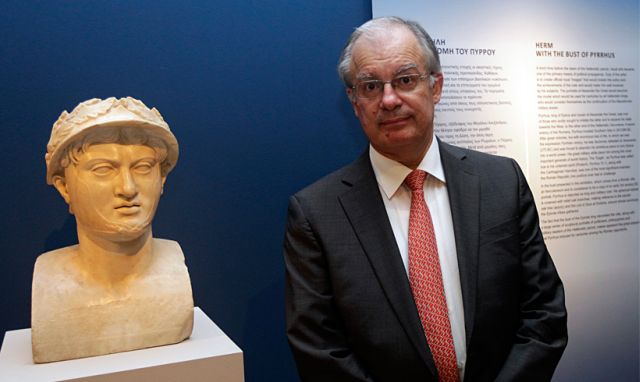For many years Greece has been struggling to reclaim the Parthenon Marbles from Britain and the current Minister of Culture made a blunder in parliament, twice at that. Aristidis Baltas first called the sculptures "Elgin" (naming them after Lord Elgin who stole them in the early 19th century) and not the Parthenon Marbles, and then revealed that the Greek government would not bring legal claims against them.
During the public meeting of the Commission on Cultural Affairs, in response to a question about the actions of the Ministry to reclaim the Marbles, Baltas said that the Greek government would not bring legal claims, as it believed that the country would lose the case.

"The tendency is not to proceed to legal claims, mainly because we risk losing the case in court", this was the exact expression of the Minister of Culture in conjunction with the European Directive of 2014 on the return of cultural property stolen from the territory of a member state.
"Alamuddin has received her fee - the cooperation with her is over"
The Minister of Culture also revealed that the cooperation of the Greek state with the British law firm that had taken on the case of returning the Parthenon Marbles had been terminated. "As for the work of the law firm where Mrs. Clooney is working, it is over. I.e. it has been paid!" said Aristidis Baltas. However, he acknowledged, "We have more friends", referring to the attendance to the Acropolis Museum, which "shows how worthy we are to welcome back the ancient monuments."
As is known, Amal Alamuddin-Clooney visited Greece in 2014, which led to an international response to the issue.

Moreover, as revealed by former Minister of Culture Costas Tasoulas, the cost of compiling the expert opinion, amounting to 200,000 pounds, was entirely covered through the sponsorship of a Greek living abroad who wished to remain anonymous.
Costas Tasoulas: The government's position is scandalous
Former Minister of Culture Costas Tasoulas reacted immediately. He said before the parliamentary commission, "The position that we would not file a claim because we would lose the case is outrageous, not only because it is strengthening the arguments of the defendant, but also because it is prejudicing in an unjust and ungrounded manner something for which Greece has too many arguments." As Costas Tasoulas pointed out, "the expertise that we have not received from the law firm in London and that engaged Mrs. Clooney and two prominent lawyers, and the intervention of this large firm in our case in general, have provided not only qualified legal knowledge but also a resounding international response in favour of the return of the Marbles." The former Minister of Culture recalled that in the days when Amal Alamuddin was in Greece, three British MPs asked questions in their parliament, requesting that the sculptures be returned to Greece.

"Our country has no reason to deprive itself of another opportunity for an international response in favour of the return of the sculptures, which would be provoked by the government invitation to the British lawyers to submit their expert opinion to the Prime Minister and the Ministry of Culture. Instead, the government refused to accept the expert opinion that was submitted through the Greek Embassy in London, apparently because it was commissioned by the previous government," says Costas Tasoulas, adding, "The government could have received the opinion and taken advantage of the publicity in favour of our demands and it had no reason to go so far as to unfairly prejudice the issue by stating that we would lose, thus strengthening the position of the other party." "Nothing is certain. But you should not declare in advance that you would lose. Greece thus recognizes that it is not right. They should have received the expert opinion and stated that they would examine it," the former Minister of Culture concluded, recalling that Greece was able to obtain a unanimous decision from UNESCO that accepted the claim of England to come to talks with Greece (2014). England did not respond within the specified term "and now we say that we would lose in court, prejudging the outcome of an international case", Costas Tasoulas stated resentfully.